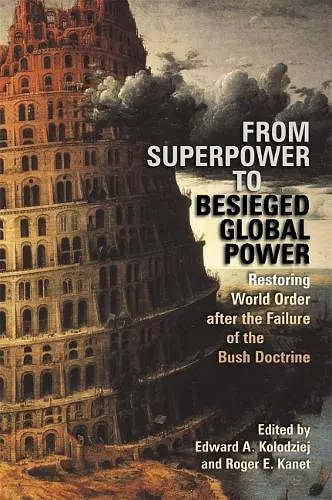From Superpower to Besieged Global Power
Restoring World Order after the Failure of the Bush Doctrine
Roger E Kanet editor Edward A Kolodziej editor
Format:Paperback
Publisher:University of Georgia Press
Published:1st May '08
Currently unavailable, and unfortunately no date known when it will be back

The essays in this volume argue that the Bush Doctrine, as outlined in the September 2002 National Security Strategy of the United States, squandered enormous military and economic resources, diminished American power, and undermined America’s moral reputation as a defender of democratic values and human rights. The Bush Doctrine misguidedly assumed that the United States was a superpower, a unique unipolar power that could compel others to accede to its preferences for world order. In reality the United States is a formidable but besieged global power, one of a handful of nations that could influence but certainly not dictate world events. The flawed doctrine has led to failed policies that extend America’s reach beyond its grasp, most painfully evident in the wars in Iraq and Afghanistan.
Leading scholars and policy analysts from nine countries assess the impact of the Bush Doctrine on world order, explain how the United States reached its current low standing internationally, and propose ways that the country can repair the untold damage wrought by ill-conceived and incompetently executed security and foreign policies. Contributors focus on the principal regions of the world where they have expertise: Asia, Europe, Africa, the Middle East, Latin America, and Russia.
The contributors agree that future security and foreign policies must be informed by the limitations of U.S. economic, cultural, and military power to shape world order to reflect American interests and values. American power and influence will increase only when the United States binds itself to moral norms, legal strictures, and political accords in cooperation with other like-minded states and peoples.
This book comes at the right time, systematically dismantling a myth on which U.S. foreign policies have been based since the end of the cold war. The contributors offer in-depth analysis of the constraints for U.S. control over power projection to all relevant regions of the world. The collection rightly widens the definition of global power by one criterion that has become critical—the soft power of cultural and ideational impact used to shape the thinking and behavior of others. This clearly is the battlefield on which the United States lost most.
* Duitsland-Instituut, University of Amsterdam *Assembling a team of sharp experts, tethering them to a clear frame of concepts and directions, and then carrying an informed evaluation of the position of the U.S. in a world it seeks to lead, Kolodziej and Kanet have produced a work that will shape and focus our debate as we head into the intellectual turmoil of the 2008 election. This volume presents the worldview more clearly than the administration itself and then takes it apart with analytical acumen in a critique that both defenders and detractors will have to take into account.
* Jacob Blaustein Distinguished Professor of International Organization and Conflict Resolution, School of Advanced International Studies, The Johns Hopkins UniversiISBN: 9780820330747
Dimensions: 235mm x 156mm x 28mm
Weight: 612g
440 pages